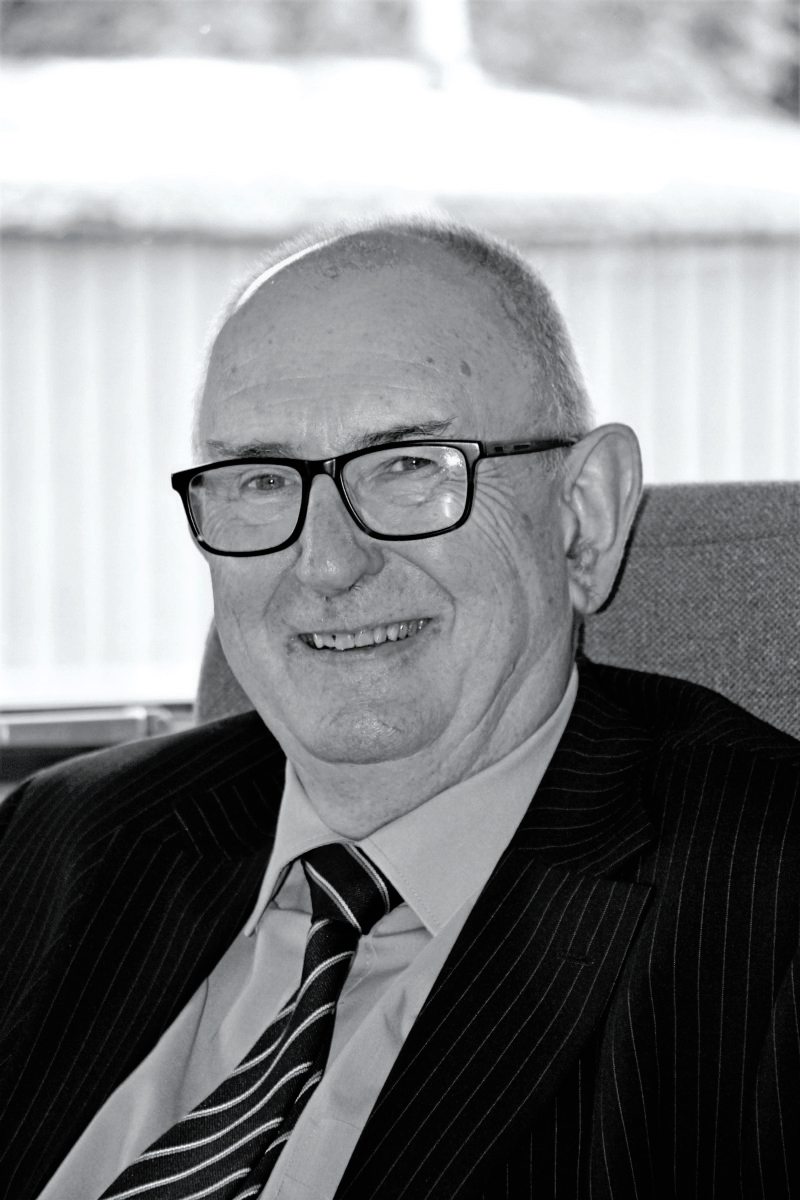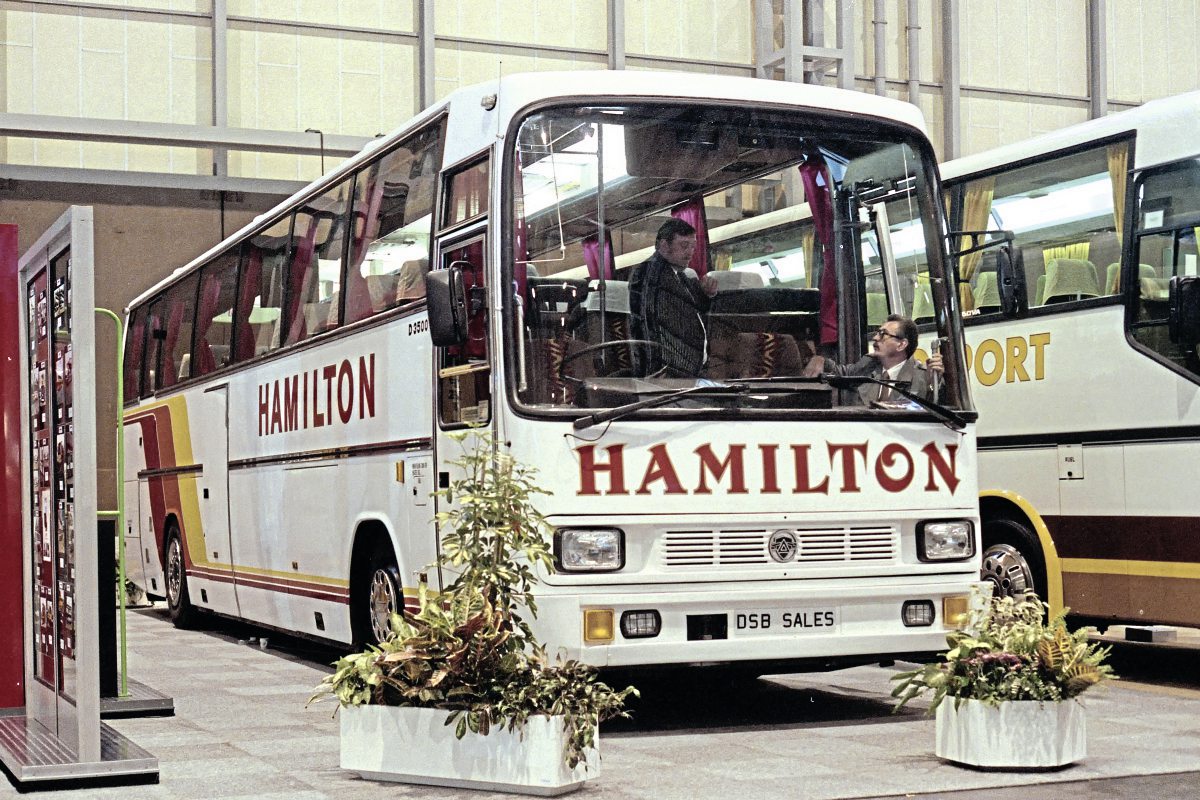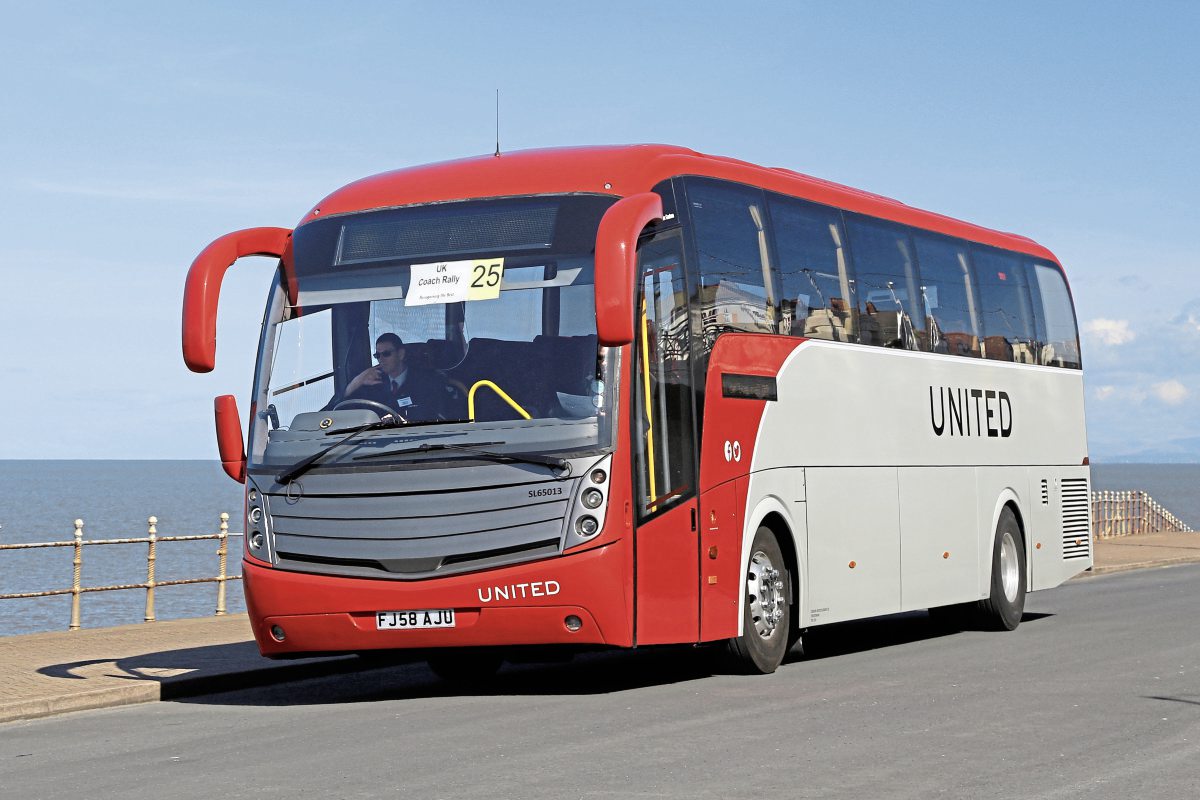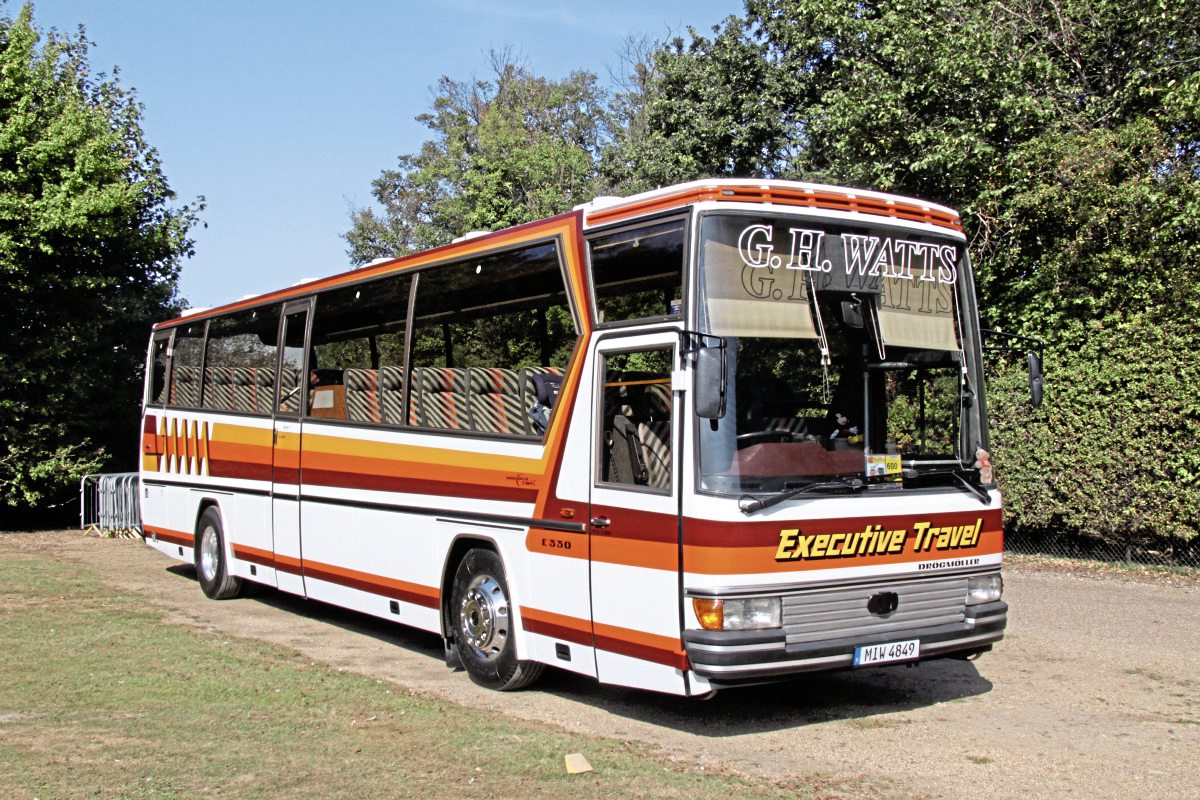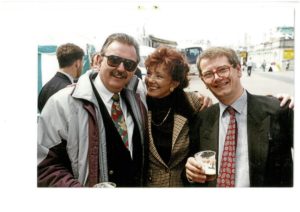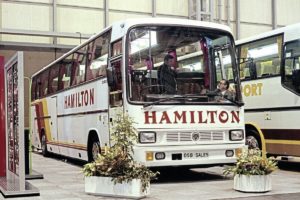All Dunn? Maybe…
Earlier this year, Salvador Caetano UK Sales Manager, John Dunn finally called time on a 15-year spell with the company and 41 years in the industry. Stuart Jones caught up with him to talk about his life in coaches
John Dunn’s had an eventful life so far. It has included spells with what was at the time possibly the strongest coach sales team ever assembled, running the dealership that brought the TAZ Dubrava to the UK.
He was involved with bringing the Marcopolo brand to these shores, saw tough times following the collapse of DSB Sales and finally landed a role at Caetano that initially saw him selling new coaches… though of late. the emphasis had been on used sales.
Early days
When John left school in Coventry he hadn’t known what he wanted to do except that it wasn’t working in a factory.
He did fancy going into sales but doubted anyone would take him on at 16, so he joined his father, working as an apprentice dental technician. It didn’t take very long to realise he was much more interested in making money than making teeth.
After around 18 months as a driving instructor he got his first proper sales job selling Singer sewing machines to housewives in a shop. This kept him interested for a few years and on 13 September 1968, at the age of 23, he got engaged to Mary. They married in August 1970.
Looking for a bigger challenge and pay packet, John joined Gailey Caravans at Meriden and after only a month, took on its depot in Nuneaton (near to where he now lives) running it for two years. Promotion saw him move to run a big depot in Nottingham but with the arrival of daughter Sara, and the imminent appearance of son Steven, Mary felt isolated.
The job involved huge time demands, closing at 7pm in winter and 9.00pm in summer, so after 15 months John switched to join John Enis at Shermin Finance, but after 12 months he knew it wasn’t for him because he says: “I couldn’t get on with selling something that wasn’t three-dimensional.”
Moseley Continental
He saw an advertisement in a paper for The Moseley Group, applied and, following an interview with the late Vin Moseley and Terry Hewitt, started in April 1977, a few weeks after his 30th birthday.
When he joined it was to cover the West Midlands along with parts of Worcestershire and Shropshire. John recalls: “You were expected to sell 100 a year but nobody ever did except Swifty (John Swift) and (Terry) Flanaghan. I regularly did between 75 and 85.”
You were expected to sell 100 a year but nobody ever did
His earliest sales were a pair of Ford R1114 Plaxton Supremes formerly with Allenways, to the Red House Group of Coventry. His first new sales were a pair of 53-seat Moseley Continental (Caetano) Estoril bodied Ford R1114s to Dave Watkiss, of Claribel Coaches.
He thoroughly enjoyed his time working for Moseley, describing it in glowing terms: “It was the best college of education. Their systems, the way they operated, their professionalism outclassed everyone else. Alf was the Chairman but the day-to-day running was done by Vin Moseley. He was an absolute gentleman and he headed the sales operation.”
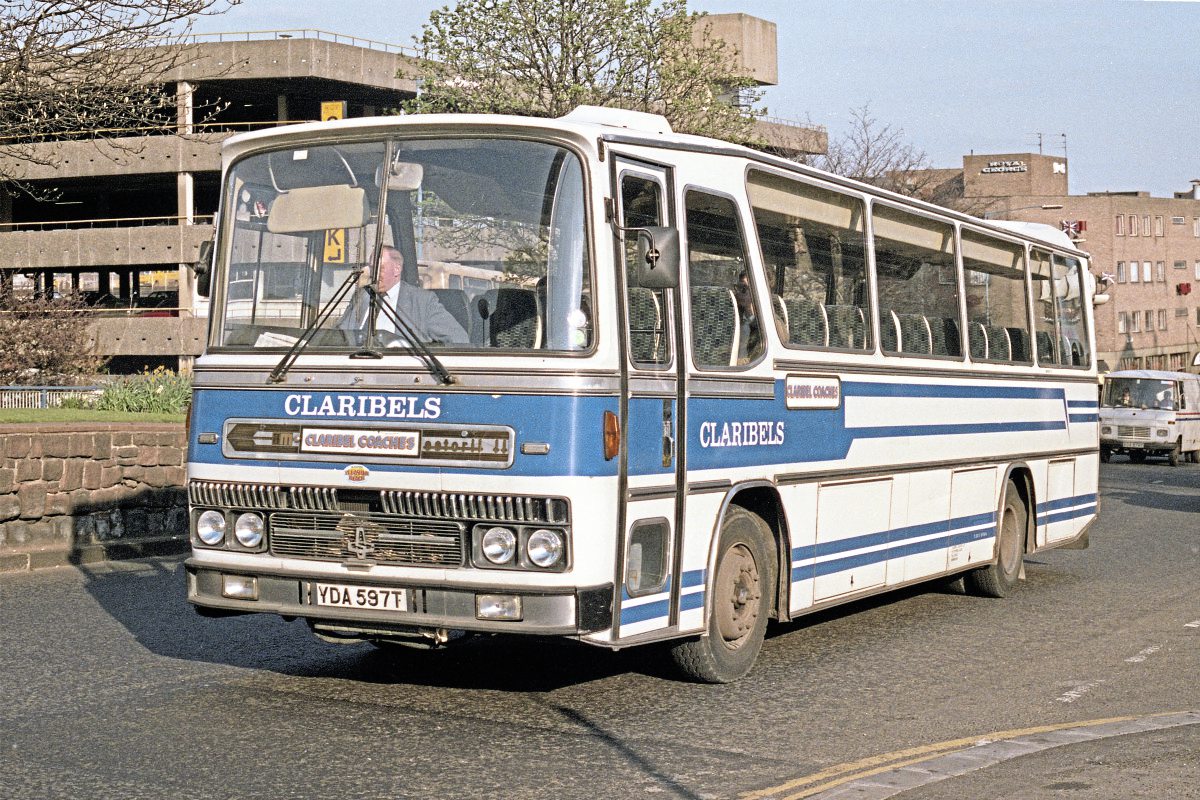
John’s first new vehicle sales included Fords with Moseley Continental (Caetano) bodywork to Claribels of Birmingham. They saw a long service life with the operator and this example still looked tidy when seen in Birmingham in 1988
Although it was extremely businesslike, there was also a tremendous camaraderie with all of the team getting together regularly and enjoying themselves, often into the early hours. Moseley representatives always had good cars and allowances for the drinks and cigarettes that they were expected to buy for operators.
Then as now, the factors that influenced achieving a sale or not could be random. He recalls taking a used coach to the premises of an operator where the father and son had both checked it from front to back and were happy. Then the mother got on board and didn’t like the moquette and, as she was the one that did the cleaning, John had to take it away unsold. This often worked the other way round: “If the wife said she liked the moquette you knew you were half way to the deal,” said John.
John became Sales Manager in 1981. In his desk he had a notepad for each salesman with details of what they were working on. He still uses the same system for himself today. He was still in that role in 1985 when he and John Swift “had a great idea. We had been chatting about it for ages and we decided we would have a go.”
DSB Sales
Established in 1986, DSB Sales took its name from the first letter of the surnames of the original directors, John Dunn, John Swift (who left in 1987 and later ran L.S.Court Coaches) and Ann Bettison who owned the G.C.Smith Coachworks business at Long Whatton where DSB was based.
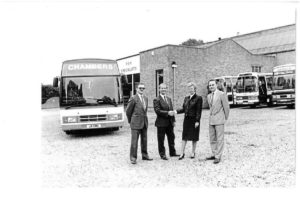
Celebrating taking on the Dennis franchise with John Dunn, Steve Burton (Dennis), Ann Prime (nee Bettison) and Mike Martin (Dennis). DSB’s Long Whatton premises are in the background
G.C.Smith was famous for its horseboxes and other specialist bodies but also had a bus/coach product in the shape of the Whippet body, designed by John Worker, on the Leyland Swift, Bedford PJK and later MAN 10-180. There was also a later coach model called the Sprinter (before the latter one with the three-pointed star) based on the VW LT chassis cowl. The first task the new company took on was buying the fleet of the Red Rover/Keiths Coaches operation at Aylesbury when they ceased operating and selling it on.
B&CB’s David Cole unwittingly influenced the future of the dealership when he wrote an article on an IAA Show that mentioned the products of Yugoslavian Automontaja – TAM. As a result of reading it, John visited the manufacturer and though there was no deal to be done (because they only built on Deutz at the time), he was pointed in the direction of another Yugoslavian manufacturer, FAP Famos.
The idea with the Dubrava was to sell it new into what had traditionally been the secondhand market. The original price was around £62,750 for the 3.2m high version and £65,750 for the 3.5m high model. In those days everything was 12m long.
There was a lot about the all-steel Dubrava (a name John came up with) to appeal to operators. It had a genuine German built Mercedes-Benz OM422 naturally-aspirated V8 engine, the back axle was a ‘proper’ Mercedes drive axle and the front axle was from a Mercedes-Benz truck. The six-speed manual transmission was a ZF unit, though built under licence by FAP-Famos.The prototype coach was shown to the Certifying Officer, David Miller, who presented them with ‘a list as long as your arm’ of things that needed putting right. The first example was painted in the brown and cream of Halford’s Coaches of Kempsey, though in the event it didn’t go to them but to David Baker’s Leoline business in London. It took John and Russell Moon, who had joined aged 21 to handle showroom sales, from February to December to get the coach certified, including trips to Bournemouth to get it tilted, only for it to fail. John recalled, “When everything else had been sorted, they measured it and said it was too wide. We had to attack the flared wheelarches with copper hammers to reduce it.”
It proved a very effective vehicle for a lot of operators, selling in respectable numbers while it was available, with a total of 88 registered in under two years.
Unfortunately, with the brand established and the future looking bright, the former Yugoslavia went to war, the factory closed and that was the end of the marque. DSB had to survive for two years on used sales.
Then, with Volvo’s acquisition of the Loughborough-based dealership, W.S Yeates, and its understandable reluctance to continue selling Dennis, the opportunity came up to take on a Plaxton Dennis franchise. DSB was back in the game but it wasn’t all roses as John explained: “The price of the secondhand coaches compared with what we had taken in against Dubravas was twice as much and we couldn’t afford it. We borrowed too much money and overstretched ourselves.”
Marcopolo
There was one last roll of the dice when DSB took on the Marcopolo brand on the Dennis Javelin because Dennis was very keen to have a low-cost product, having lost the Duple range from its portfolio.
I went to the factory in Coimbra, Portugal, with John and Tony Halford to see the first two coaches being built. There were a lot of issues, and eventually John did succeed in getting it to the market. But it was too late; the financial issues were by then too great to overcome.
With the collapse of DSB, the Marcopolo franchise and a batch of coaches in build went to Alf Moseley Continental with John rejoining his former employer. Under Alf, the Dennis chassis gave way to MAN chassis and was sold alongside the Noge range from his Shepshed headquarters. Some years later the distributorship went to BASE and when the Brazilian giant decided to discontinue its European manufacturing arm, former director, Antonio Catarino, established MOBIpeople in 2008.
It is clear when you talk to John that he still feels bad about the collapse of DSB Sales, and especially the impact on his fellow director, but he was never one to hide away and mope and he needed a job. He also recalls that “we had a lot of fun while it lasted”.
Drögmöller
Something many people forget is that in 1986, before the Plaxton Dennis deal, there was an ultimately ill fated project for DSB to bring the Drögmöller brand to the UK.
The German integral manufacturer was unashamedly at the top of the market, above even Setra at the time, with a reputation for quality and an impressive model line up including a double-deck coach and high-floor coaches with theatre seating. John Swift and John had seen a Drögmöller Comet at the NEC and asked the company whether it was interested in a UK dealership.
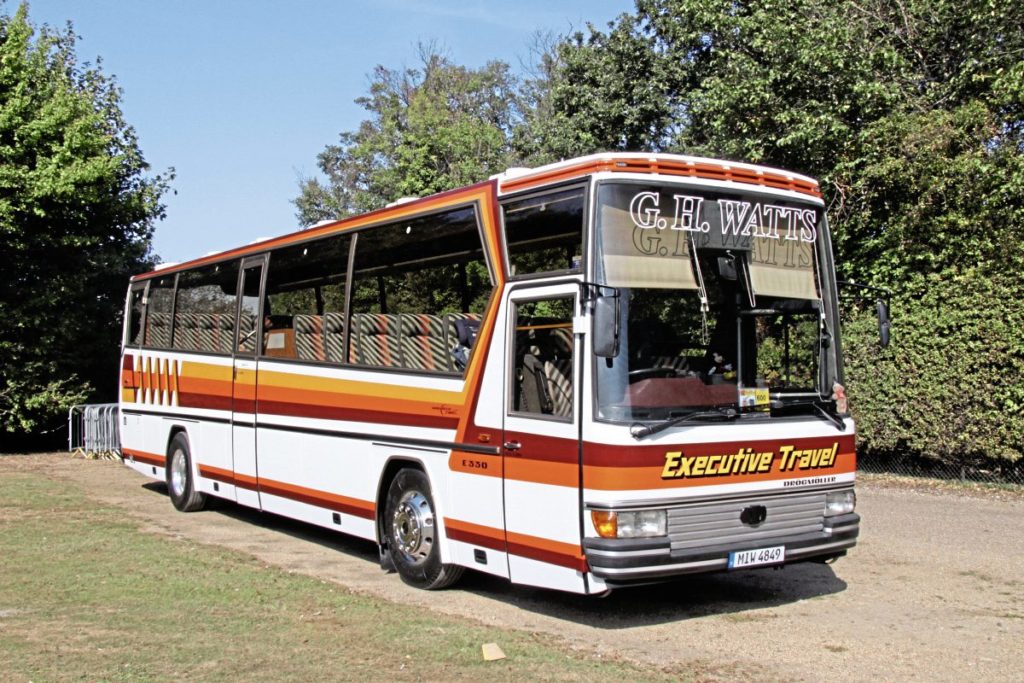
The only Droegmoeller Comet (with tiered seating) for the UK is now a heritage vehicle with GH Watts Coaches in Leicester
The directors went to Germany and the factory was very impressive, as was the build quality, with insulation pumped into the frame like cavity wall insulation. A show at Long Whatton had a left-hand drive Comet as the centrepiece and the proposition proved very acceptable to operators.
The original costings envisaged DSB buying it in at a little over £90,000 a unit and selling it for around £110,000-£115,000, so they ordered one. While it was in build the pound took a dive and as a result the ex works price to DSB rose to around £120,000, meaning it would have had a price to operator of in excess of £130,000, something that would have been impossible to achieve at that time, leading John to pull the plug on the scheme.
Ultimately, Drögmöller was bought by Volvo in the mid 1990s, the range was replaced by Volvo-powered models and after a while the plant at Heilbronn closed. A legacy is the Volvo 9900 with its theatre style seating, a concept originally introduced to satisfy former Drögmöller customers but still evident in the latest model that will appear at the NEC.
West Midlands PCV
From 1999 to 2003 John worked with Dave Harley at West Midlands PCV, a business based in Rugeley that was closely connected to Dave’s Trent Valley Travel operation. Here it was all about buying and selling secondhand vehicles, including buses. It wasn’t at all glamorous, but it kept the wolf from the door.
Salvador Caetano UK
When John joined Caetano in 2003, it was as an Area Manager at a time when the business was centred on retailing new buses and coaches as well as the part exchanges that they generated.
Over the intervening period the whole emphasis has moved away from retail sales to focus on meeting the needs of National Express which had selected the Levante as the coach for all of its UK express operations along with the Invictus double deck. The Levante’s innovative front step lift, the brainchild of current Caetano UK CEO, Richard Hunter, is still the best solution for achieving inclusion for people with mobility impairment.
John eventually became Sales Manager by default when there were no other area managers left. With all of the changes the once bustling office had become a much quieter place.
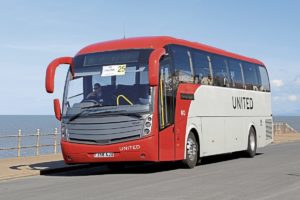
John has been pleased with the resale appeal of the Caetano Levante after service with National Express contractors
Latterly, John’s new sales opportunities had centred on smaller coaches. The various incarnations of the Caetano Optimo-bodied Toyota Coaster chassis were good sellers during the late 1980s and 1990s but Toyota failed to develop the model to keep up with market requirements and the ‘manual gearbox only approach’, the limited capacity and the relatively basic suspension all contributed to it losing ground to other manufacturers, particularly Mercedes-Benz.
The very last Optimo supplied went to Pambus in Cyprus around 2014. Their more stylish last variant, the CS700, which had similar frontal styling to the Levante, the first of which went to Hodges of Sandhurst in 2012, didn’t excite the market greatly and only ten were ever built for the UK.
Subsequently, Caetano did develop a coachbuilt Omega 29-seat body on the Iveco Daily C70 chassis but this was also not a great seller in a competitive market.
Asked about the Levante coaches that have been the backbone of the Caetano business for the past decade, John observed: “A coach only proves its value when you sell it secondhand, and used Caetanos have proved good sellers. It’s an easily convertible, versatile vehicle, so it sells well.”
I think the Caetano, for what it does, is one of the best on the market.
He doesn’t get nostalgic or evangelical about the merits of different coaches he has encountered: “Someone once asked me what I thought the best vehicle on the market was, and I told them it was the last one I’d sold, whatever it was. I am not an engineer, I don’t run them and looks are subjective,” he said.
The future
When he got to 65, Mary asked him: “What are you going to do now?” She wasn’t entirely surprised by the reply: “I’ve got it all mapped out: I’m going to sell buses.”
Now 71, John had not intended to retire in 2018, he had intended to stay until 2019 when the last batch of buses operating in London were scheduled to return.
Earlier in 2018, the operator decided to buy the buses rather than sending them back. “So there wasn’t anything left for me to do,” said John. “Am I looking forward to retirement? No, but I have come to a natural conclusion with what I’ve done here.”
He is proud of what he has achieved at Caetano, including selling in excess of 250 used buses as part of a contract between Caetano and Investec that was signed in 2010: “The Investec deal has kept me going for the last ten years. I’ve covered my expenses and I’ve made them a profit,” he said.
Looking forward, he commented: “I’m sure I will get the odd phone call.” He has retained his consultancy with his good friend, Pambos Kapnos who is the son in Kapnos & Son, the biggest operator in Cyprus. When John first met him ten years ago he had eight vehicles; now he has upwards of 130.
His father came to the UK in the early 1990s and bought two used Dubravas from Dave Bennett of Hamilton Services. When he was looking for more vehicles he went to see Dave who had nothing to sell and gave him John’s name: “I’ve been involved in every vehicle he has bought since and will continue to advise on his purchases in the UK,” said John.
The couple moved from Shepshed to Nuneaton to be nearer their grandchildren in 2006. John says ‘I don’t have hobbies’ but intends to do a lot more caravanning now as well as spending more time with his 10- and 13-year-old granddaughters. Their mother is a school teacher so John and Mary are committed to school runs for the next two years.
He will also continue to act as a consultant for his friends in Cyprus and in the weeks since he left has seen quite a large number of Citaro buses depart there.
Behind him throughout has been Mary: “I couldn’t have done it without her,” he said. “She straightens me up when I get it wrong.”
